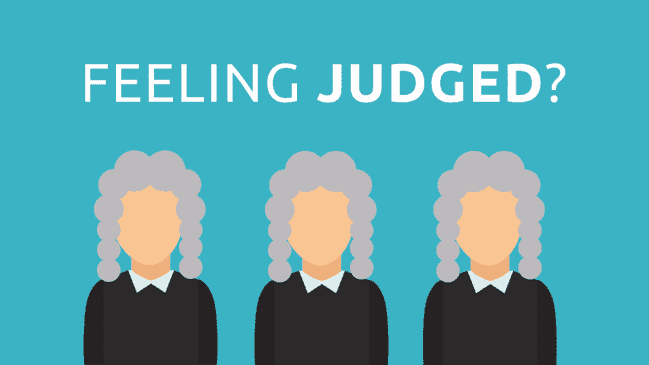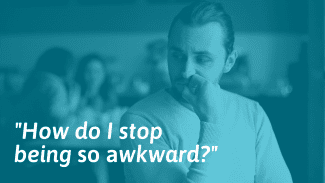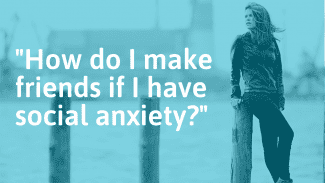Ever felt like when you’re about to say something, people will judge you?
Or, that people judge you already when you walk into the room?
Here’s what one of our readers wrote to me:
“I find it difficult to start and continue conversations, and worry that everything I’m doing is being judged by others.”
My strongest memory of this was at a dinner with other startup owners. I hadn’t achieved as much as they had, and I felt like a fraud.
The way they looked at me confirmed that they were on to me. (At least, that’s what it felt like.)
Today, I know that my brain made its own interpretation of their looks.
If someone has a skeptical look, there’s no way to know if they’re actually skeptical, if they’re tired, if their thoughts are elsewhere, or if it’s just their listening face.
What we DO know is that we who are anxiously inclined massively overestimate how much others judge us.
People just don’t care that much about others. They are too occupied with their own thoughts, just like you and I are occupied with ours.
In fact, one recent study on 100 children showed that those who were more socially anxious were “hypersensitive” to making mistakes when others were watching them (ref).
That study made so much sense to me:
The root cause of social anxiety is being overly scared of being judged for our mistakes.
It can be because we had parents who scolded us for our mistakes or maybe we had a bad time in school. (ref)
I know a guy in that business network who’s rich, successful, and tall. But no one really likes him, because he’s a stuck up.
On the opposite is one of my best friends here in the US. She’s not rich, nor successful, nor tall. She’s quite clumsy and a little shy. Everyone loves her.
Why?
Because she’s human and relatable.
Lesson learned:
Having flaws makes us human and relatable.
In what situations do you feel judged by others? How do you deal with it? Let me know in the comments!








I feel judged when having a conversation and when I walk into a classroom or anyplace else. It feels like their all staring at you a d questioning “what is she doing here..?” With conversations I would think that everything I say is boring so I try and make them short.
Definitely my childhood played a huge role. I could not relate to my peers as I had different interests than most. And was shunned for not fitting in. Being like them. Therefore did not have anyone to talk to or learn communications skills or how to conversate. To top it off, people WERE judging me left and right. So once I became an adult I was left without conversational skills, and always worried what people are thinking or saying behind my back. The feeling everyone was staring and judging me. It’s still with me today. I don’t know that I’ve found a way to deal with it other than finding other like minded people. People who share my wierd interests (reptiles, bugs, creatures) and not associate myself with others. I don’t really like people though to this day. They can be very hateful, cruel, selfish… So even hanging around like minded people, I constantly have a feeling of wanting to go home after a bit of talking.
This reminds me of an article I read a while ago about the “spotlight effect.” I tend to focus too much on myself and what other people think of me, even while doing everyday things such as buying groceries. You’re right, people don’t react as much to my mistakes as I expect, as long as I laugh it off and am not too awkward about it!
Hey there.
I feel I didn’t really suffer from a mis calibration from childhood. In fact my parents had a very liberal kind of a style in bringing me up and they let me explore things on my own. So, this point may not be relevant in my situation.
Also, though I know that I am not perfect, there are some people out there who think I am. Thus, they end up being jealous of me and hate me. So who’s at fault here? I am who I am and I don’t think so it would be appropriate to start messing things up in order to get people not to hate me. And even if I start making mistakes, I think the people who hate me would rather find a reason to mock at me and feel good about themselves.
This is a teenager who thinks a lot and gets mired in unnecessary stress.
It’s not about messing up on purpose, but about making yourself more relatable to others. For example, if you are talking with someone that tells you how messed up their childhood was, but you know your childhood was amazing, maybe don’t mention how good your childhood was to them. Instead focus on understanding their perspective and listening to them, make them feel better by being a good listener, then they will like you more and feel closer to you. If you would answer back with how amazing your childhood was, they might see it like you are trying to be better than them even if you are just being truthful.
Then there will always be haters, everyone isn’t worth your time and energy. But you can use this to make yourself more relatable to people you care about.
Thank you so much!
To be honest, I do aim for perfection, dress up my best and get good marks in school. If this invoked any hate, I am not guilty.
But I sense all the hate before any interaction starts. They think I am rude. Thus, they end up distancing themselves from me. People who end up talking to me find me quite relatable and the opposite of whatever negative they thought before. I have learnt to save my energy for the ones I care for which helps me avoid stress about what others think.
Anyways, glad to here from you.